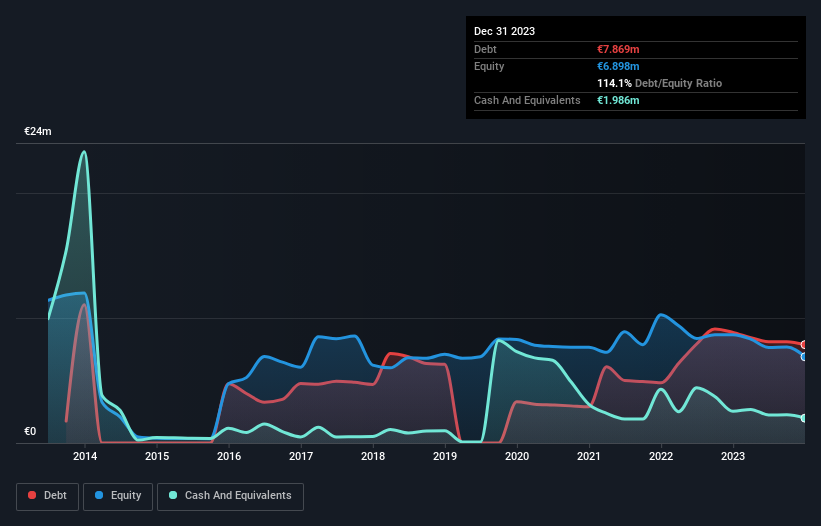Stock Analysis
- Norway
- /
- Renewable Energy
- /
- OB:AEGA
Is Aega (OB:AEGA) Using Debt Sensibly?

Some say volatility, rather than debt, is the best way to think about risk as an investor, but Warren Buffett famously said that 'Volatility is far from synonymous with risk.' So it might be obvious that you need to consider debt, when you think about how risky any given stock is, because too much debt can sink a company. As with many other companies Aega ASA (OB:AEGA) makes use of debt. But is this debt a concern to shareholders?
When Is Debt Dangerous?
Debt and other liabilities become risky for a business when it cannot easily fulfill those obligations, either with free cash flow or by raising capital at an attractive price. Ultimately, if the company can't fulfill its legal obligations to repay debt, shareholders could walk away with nothing. While that is not too common, we often do see indebted companies permanently diluting shareholders because lenders force them to raise capital at a distressed price. Of course, the upside of debt is that it often represents cheap capital, especially when it replaces dilution in a company with the ability to reinvest at high rates of return. The first step when considering a company's debt levels is to consider its cash and debt together.
View our latest analysis for Aega
What Is Aega's Net Debt?
The image below, which you can click on for greater detail, shows that Aega had debt of €7.87m at the end of December 2023, a reduction from €8.85m over a year. On the flip side, it has €1.99m in cash leading to net debt of about €5.88m.

A Look At Aega's Liabilities
The latest balance sheet data shows that Aega had liabilities of €2.11m due within a year, and liabilities of €11.6m falling due after that. Offsetting these obligations, it had cash of €1.99m as well as receivables valued at €1.59m due within 12 months. So its liabilities total €10.2m more than the combination of its cash and short-term receivables.
The deficiency here weighs heavily on the €4.45m company itself, as if a child were struggling under the weight of an enormous back-pack full of books, his sports gear, and a trumpet. So we definitely think shareholders need to watch this one closely. At the end of the day, Aega would probably need a major re-capitalization if its creditors were to demand repayment. When analysing debt levels, the balance sheet is the obvious place to start. But you can't view debt in total isolation; since Aega will need earnings to service that debt. So if you're keen to discover more about its earnings, it might be worth checking out this graph of its long term earnings trend.
In the last year Aega wasn't profitable at an EBIT level, but managed to grow its revenue by 28%, to €3.4m. Shareholders probably have their fingers crossed that it can grow its way to profits.
Caveat Emptor
Importantly, Aega had an earnings before interest and tax (EBIT) loss over the last year. To be specific the EBIT loss came in at €23k. Considering that alongside the liabilities mentioned above make us nervous about the company. We'd want to see some strong near-term improvements before getting too interested in the stock. For example, we would not want to see a repeat of last year's loss of €1.7m. And until that time we think this is a risky stock. The balance sheet is clearly the area to focus on when you are analysing debt. However, not all investment risk resides within the balance sheet - far from it. Be aware that Aega is showing 5 warning signs in our investment analysis , and 2 of those make us uncomfortable...
Of course, if you're the type of investor who prefers buying stocks without the burden of debt, then don't hesitate to discover our exclusive list of net cash growth stocks, today.
Valuation is complex, but we're helping make it simple.
Find out whether Aega is potentially over or undervalued by checking out our comprehensive analysis, which includes fair value estimates, risks and warnings, dividends, insider transactions and financial health.
View the Free AnalysisHave feedback on this article? Concerned about the content? Get in touch with us directly. Alternatively, email editorial-team (at) simplywallst.com.
This article by Simply Wall St is general in nature. We provide commentary based on historical data and analyst forecasts only using an unbiased methodology and our articles are not intended to be financial advice. It does not constitute a recommendation to buy or sell any stock, and does not take account of your objectives, or your financial situation. We aim to bring you long-term focused analysis driven by fundamental data. Note that our analysis may not factor in the latest price-sensitive company announcements or qualitative material. Simply Wall St has no position in any stocks mentioned.

Simply Wall St
About OB:AEGA
Aega
Aega ASA, an investment company, focuses on solar power and renewable energy industries.
Good value with mediocre balance sheet.
